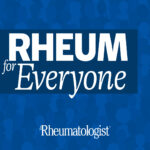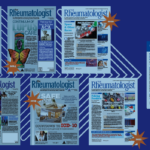In this episode, Dr. Bharat Kumar, physician editor of The Rheumatologist, discusses the definition of empathy and its role in rheumatology.

Subcategories:Speak Out RheumVideo

In this episode, Dr. Bharat Kumar, physician editor of The Rheumatologist, discusses the definition of empathy and its role in rheumatology.

Rheumatologists who are outstanding researchers, educators and/or clinicians, who provide consistently exceptional care to patients, who have achieved a level of distinction in the field and who serve as role models for colleagues and trainees are highlighted in this recurring series. Fred Wigley, MD, MACR, is the Martha McCrory Professor of Medicine at the Johns…

Is it 2024 already? It seems like yesterday that I stuffed all my earthly belongings into my black Volkswagen Jetta and headed from Lexington, Ky., to Iowa City, Iowa, to start my rheumatology fellowship.1 That was 10 years ago. Now, in 2024, as I go online—particularly on social media—and see the various happy, smiling faces…

I couldn’t help but roll my eyes. I was at a mandatory “training session” on patient communication for all clinicians at my institution. There, I was being coached on how to properly talk to patients. In theory, this isn’t a bad thing—we all need more education on how to facilitate inclusive and equitable conversations with…

SAN DIEGO—“I’m going to get personal,” said Kaleb Michaud, PhD, in the ARP Distinguished Lecture at ACR Convergence 2023. When he was 3 years old, the young Kaleb was diagnosed him with juvenile rheumatoid arthritis (JRA).

In this episode, Dr. Kumar and guest Lindsay Moy, DO, a rheumatology fellow at the University of Iowa, discuss the intersection of immunology and rheumatology. Answer their question on X @BharatKumarMD.

Editor’s note: Rheumatologists who are outstanding researchers, educators and/or clinicians, who provide consistently exceptional care to patients, have achieved a level of distinction in the field and serve as role models for colleagues and trainees are highlighted in this recurring series. Be curious. Listen to your patients. Demonstrate empathy. These traits, according to Herbert S.B….

I was cleaning out an old storage closet in my parents’ house in Florida when I stumbled across some notes I took in medical school. As I leafed through pages and pages of notes filled with doodles and reminders, I found a statement that gave me pause: “Immunology—what is it good for?!” To be honest,…

Donald Thomas, MD, FACP, FACR, RhMSUS, & Jason Liebowitz, MD |
Think about it. Most rheumatology labs are stuck in the 1960s. Translational biomarker research looks excellent on paper and in theory. However, many barriers exist from the bench to the bedside. This article highlights this problem for the rheumatology community and proposes practical solutions. Case in Point For an example, let’s examine systemic lupus erythematosus…

If you’ve been a long-time reader of The Rheumatologist, you may have noticed that things look just a little different in this issue. The logo has changed, the font appears distinct, and the bylines are, for lack of a better term, aligned differently. If you’re looking at this online, the menus have changed somewhat, and…